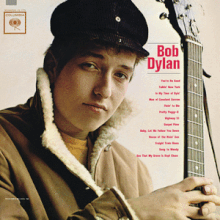Bob Dylan (album)
| Bob Dylan | ||||
|---|---|---|---|---|
 |
||||
| Studio album by Bob Dylan | ||||
| Released | March 19, 1962 | |||
| Recorded | November 20 and 22, 1961, Columbia Recording Studio, New York City | |||
| Genre | Folk, country blues | |||
| Length | 36:54 | |||
| Label | Columbia | |||
| Producer | John H. Hammond | |||
| Bob Dylan chronology | ||||
|
||||
| Professional ratings | |
|---|---|
| Review scores | |
| Source | Rating |
| AllMusic | |
| Entertainment Weekly | B |
| MusicHound | |
| Rolling Stone | |
| The Rolling Stone Album Guide | |
Bob Dylan is the eponymous debut studio album by American singer-songwriter Bob Dylan, released on March 19, 1962 by Columbia Records. Produced by Columbia's legendary talent scout John H. Hammond, who signed Dylan to the label, the album features folk standards, plus two original compositions, "Talkin' New York" and "Song to Woody".
Dylan met John Hammond at a rehearsal session for Carolyn Hester on September 14, 1961, at the apartment shared by Hester and her then-husband, Richard Fariña. Hester had invited Dylan to the session as a harmonica player, and Hammond approved him as a session player after hearing him rehearse, with recommendations from his son, musician John P. Hammond, and from Liam Clancy.
Hammond later told Robert Shelton that he decided to sign Dylan "on the spot", and invited him to the Columbia offices for a more formal audition recording. No record of that recording has turned up in Columbia's files, but Hammond, Dylan, and Columbia's A&R director Mitch Miller have all confirmed that an audition took place. (Producer Fred Catero, then a recording engineer for Columbia Records, claims to have the master of that session. It is not the original demo for Columbia, but a session from December 6, 1962, recorded by John Hammond, Sr.)
On September 26, Dylan began a two-week run at Gerde's Folk City, second on the bill to The Greenbriar Boys. On September 29, an exceptionally favorable review of Dylan's performance appeared in the New York Times. The same day, Dylan played harmonica at Hester's recording session at Columbia's Manhattan studios. After the session, Hammond brought Dylan to his offices and presented him with Columbia's standard five-year contract for previously unrecorded artists, and Dylan signed immediately.
...
Wikipedia
